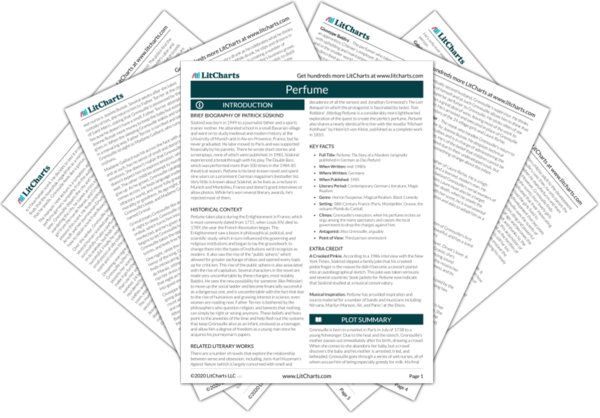Brief Biography of Patrick Süskind
Süskind was born in 1949 to a journalist father and a sports trainer mother. He attended school in a small Bavarian village and went on to study medieval and modern history at the University of Munich and in Aix-en-Provence, France, but he never graduated. He later moved to Paris and was supported financially by his parents. There he wrote short stories and screenplays, none of which were published. In 1981, Süskind experienced a breakthrough with his play The Double Bass, which was performed more than 500 times in the 1984-85 theatrical season. Perfume is his best-known novel and spent nine years on a prominent German magazine's bestseller list. Very little is known about Süskind, as he lives as a recluse in Munich and Montolieu, France and doesn't grant interviews or allow photos. While he's won several literary awards, he's rejected most of them.
Historical Context of Perfume
Perfume takes place during the Enlightenment in France, which is most commonly dated from 1715, when Louis XIV, died to 1789, the year the French Revolution began. The Enlightenment saw a boom in philosophical, political, and scientific study, which in turn influenced the governing and religious institutions and began to lay the groundwork to change them into the types of institutions we'd recognize as modern. It also saw the rise of the "public sphere," which allowed for greater exchange of ideas and opened every topic up for criticism. This rise of the public sphere is also associated with the rise of capitalism. Several characters in the novel are made very uncomfortable by these changes, most notably Baldini. He sees the new possibility for someone (like Pélissier) to move up the social ladder and become financially successful as a dangerous one, and is uncomfortable with the fact that due to the rise of humanism and growing interest in science, even women are reading now. Father Terrier is bothered by the philosophers who question religion, and laments that nothing can simply be right or wrong anymore. These beliefs and fears point to the anxieties of the time and help flesh out the systems that keep Grenouille alive as an infant, enslaved as a teenager, and allow him a degree of freedom as a young man once he acquires his journeyman's papers.
Other Books Related to Perfume
There are a number of novels that explore the relationship between sense and obsession, including Joris-Karl Huysman's Against Nature (which is largely concerned with smell and decadence of all the senses) and Jonathan Grimwood's The Last Banquet (in which the protagonist is fascinated by taste). Tom Robbins' Jitterbug Perfume is a considerably more lighthearted exploration of the quest to create the perfect perfume. Perfume also shares a nearly identical first line with the novella "Michael Kohlhaas" by Heinrich von Kleist, published as a complete work in 1810.
Key Facts about Perfume
-
Full Title: Perfume: The Story of a Murderer (originally published in German as Das Parfum)
-
When Written: mid-1980s
-
Where Written: Germany
-
When Published: 1985
-
Literary Period: Contemporary German Literature, Magic Realism
-
Genre: Horror/Suspense, Magical Realism, Black Comedy
-
Setting: 18th Century France (Paris, Montpellier, Grasse, the volcano Plomb du Cantal)
-
Climax: Grenouille's execution, when his perfume incites an orgy among the many spectators and causes the local government to drop the charges against him.
-
Antagonist: Also Grenouille, arguably
-
Point of View: Third person omniscient
Extra Credit for Perfume
